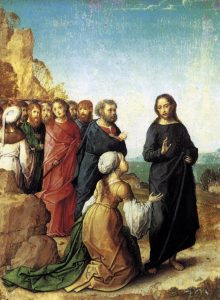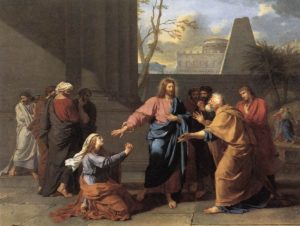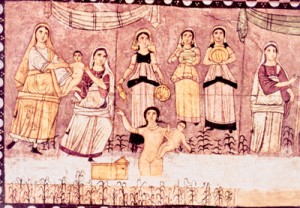Thoughts on Sunday’s Lessons for Aug. 16, 2020
First Reading (Track One): Genesis 45:1-15
Now in mid-August we approach the midpoint of the long season after Pentecost, and we see our lectionary narratives begin to turn.

Christ and the Canaanite Woman (c.1500), oil painting on panel by Juan de Flandes (1450-1519). Royal Palace of Madrid, Spain. (Click image to enlarge.)
Sunday’s first reading marks the last in a series of ancestral stories about Abraham, Isaac, Jacob, and Joseph; and Sunday’s Gospel shows us Jesus and the apostles leaving Galilee for the last time as they begin their journey toward Jerusalem and the cross. In our Track One first reading, Joseph has been through a lot since last week’s reading, when his jealous brothers sold him into slavery. He went to Egypt, did well, fell from grace, was sent to prison on a false charge, but bounced back to become Pharaoh’s chief governor. Now his brothers have come to Egypt fleeing famine, and they meet Joseph. As you can imagine, they fear his revenge! But Joseph forgives them in a tearful reunion, and the ancestral line of the Bible’s patriarchs will live on.
First Reading (Track Two): Isaiah 56:1,6-8
Sunday’s Track Two first reading turns to the closing chapters of Isaiah’s long book of prophecy. The people have returned home to Jerusalem, and now they face the arduous task of rebuilding the city and the temple. Isaiah reminds the people that, just as they lost the land for their failure to be righteous and just, they may no longer keep the holy city for themselves alone, even though they “maintain justice and doing what is right.” The covenant that God made with Moses is now for all people, for all the nations. Even foreigners and aliens who hold fast to the covenant principles will be gathered in, welcomed in the temple and made joyful. Hear Jesus echo this principle in Sunday’s Gospel when he recognizes the Canaanite woman’s faith.
Psalm (Track One): Psalm 133
Mirroring the joy of Joseph’s reunion with his brothers, the Psalmist celebrates the blessed state of brothers and sisters abiding together in unity. Just as Joseph’s family came back together in love, and as Paul will urge the Jewish and Pagan Christian communities in Rome to rejoin in friendship, we hear again how good and pleasant it is when families and friends live together in blessed unity.
Psalm (Track Two): Psalm 67
In one of those small mysteries of the Lectionary cycle, we hear again a Psalm that we sang just three months ago during Eastertide. It fits in neatly with Sunday’s readings, though: In its joyous call to all the nations of Earth to sing together in peace and praise, it reinforces what we heard in the Isaiah reading and foreshadows Paul’s words from Romans. Let all the nations praise God and pray for God’s blessing, the Psalmist sings, for through God the earth gives forth its bounty, and all the earth sings out its praise.
Second Reading: Romans 11:1-2a, 29-32
Paul continues his exhortation to Rome’s Jewish Christian and Gentile Christian communities to restore the unity that they enjoyed before the Jewish portion was sent away on a short exile. Paul points up his own Jewish heritage, placing himself in Abraham’s direct line as a descendant of Benjamin, the youngest of Joseph’s brothers, whom Joseph loved. Paul assures us that God’s promises to Israel and to the Gentiles are equally irrevocable, regardless of our disobedience. We all earn God’s love, regardless of our sins, regardless of our ancestry. God is merciful to all.
Gospel: Matthew 15:10-28
Sunday’s Gospel offers us two separate short stories. Their placement joining Jesus’ last encounter in Galilee and his first in Gentile territory as he and the apostles begin their journey to Jerusalem may be more than just a coincidence. It seems to express that for the first time that Jesus’ way is not only for Jews but Gentiles as well. First, Jesus mocks a group of Pharisees who had challenged his disciples for ignoring ritual traditions. He speaks a blunt and rather earthy criticism: Neglecting to wash our hands before eating doesn’t defile us, but the words that come out of our mouths may do so. Then, Jesus shocks us with a fiercely unkind insult, likening a Canaanite woman who sought help for her daughter to stray dogs scrounging for crumbs. Really, Jesus? Really? But the words from the mother’s mouth clearly come from her heart. The encounter seems to change Jesus. He praises her faith and heals her child.
What are “Track 1” and “Track 2”?
During the long green season after Pentecost, there are two tracks (or strands) each week for Old Testament readings. Within each track, there is a Psalm chosen to accompany the particular lesson.
The Revised Common Lectionary allows us to make use of either of these tracks, but once a track has been selected, it should be followed through to the end of the Pentecost season, rather than jumping back and forth between the two strands.
For more information from LectionaryPage.net, click here.


